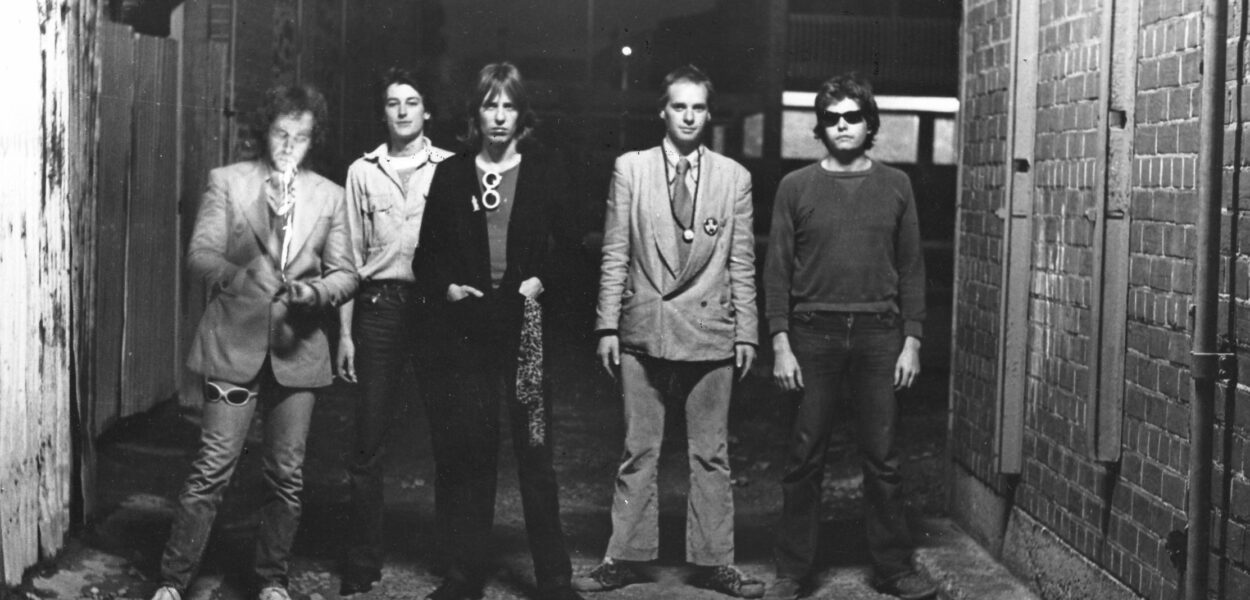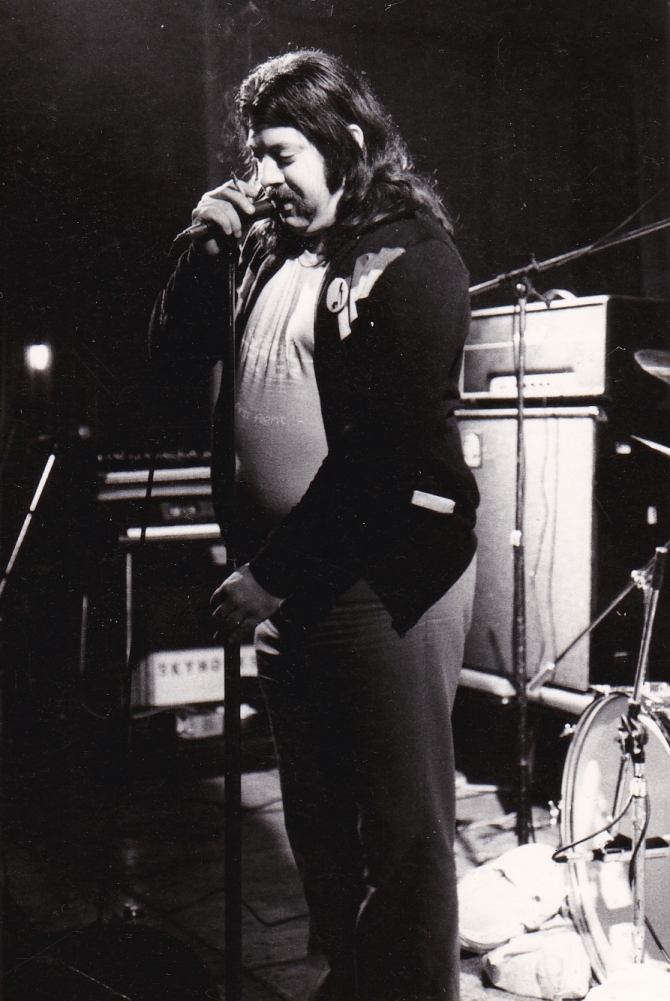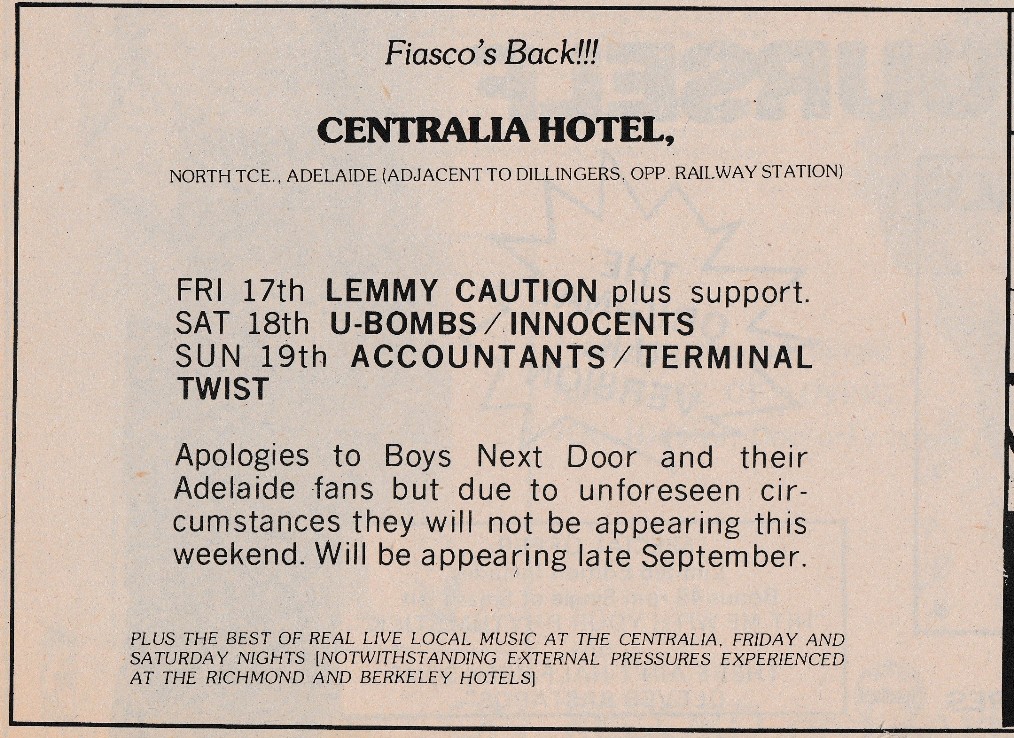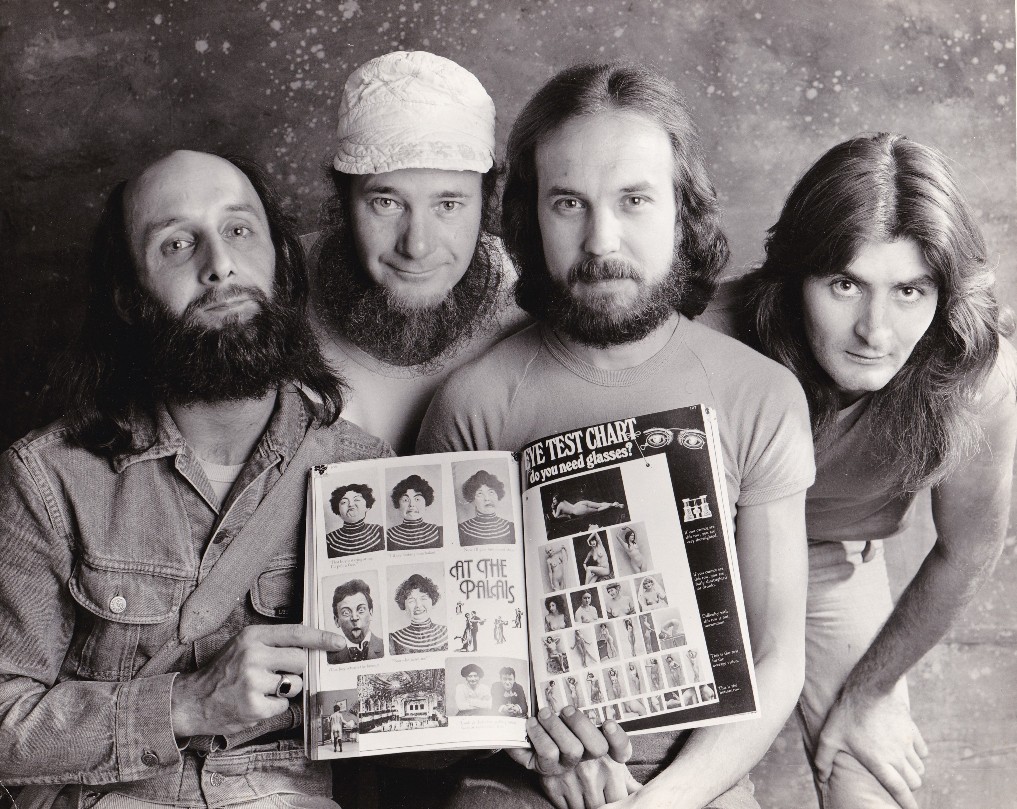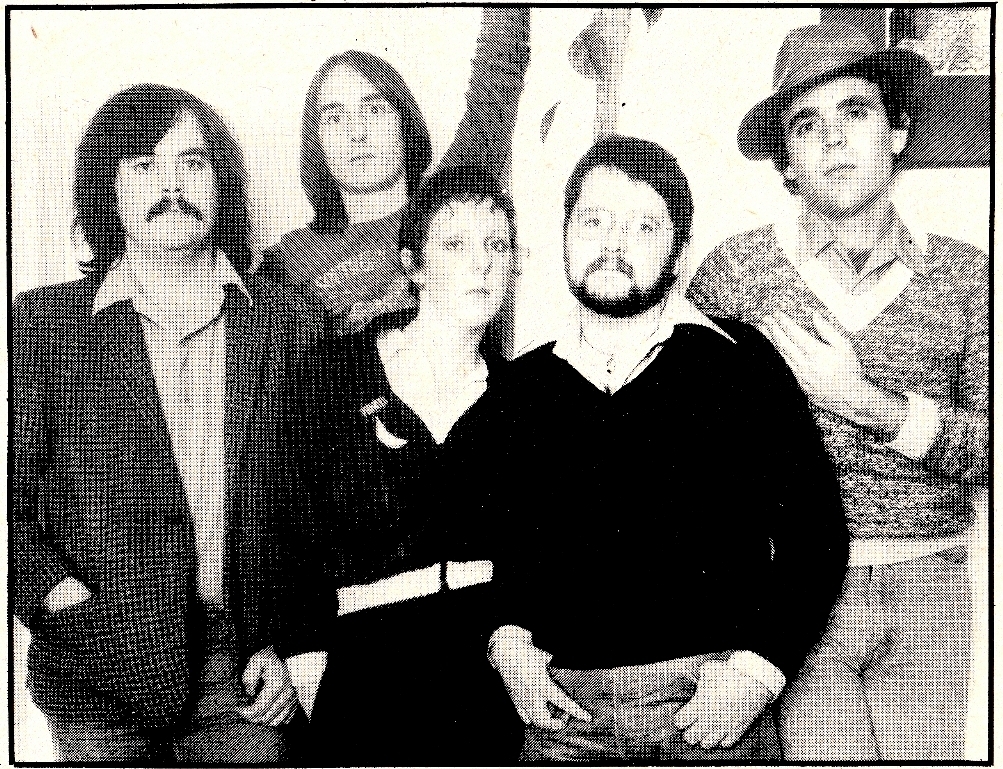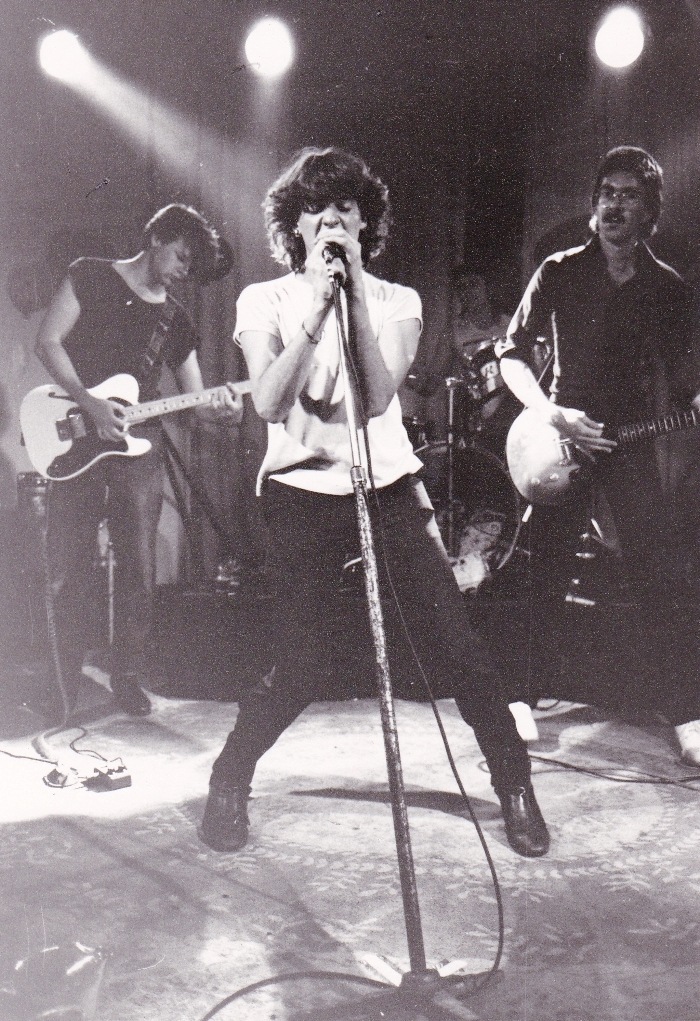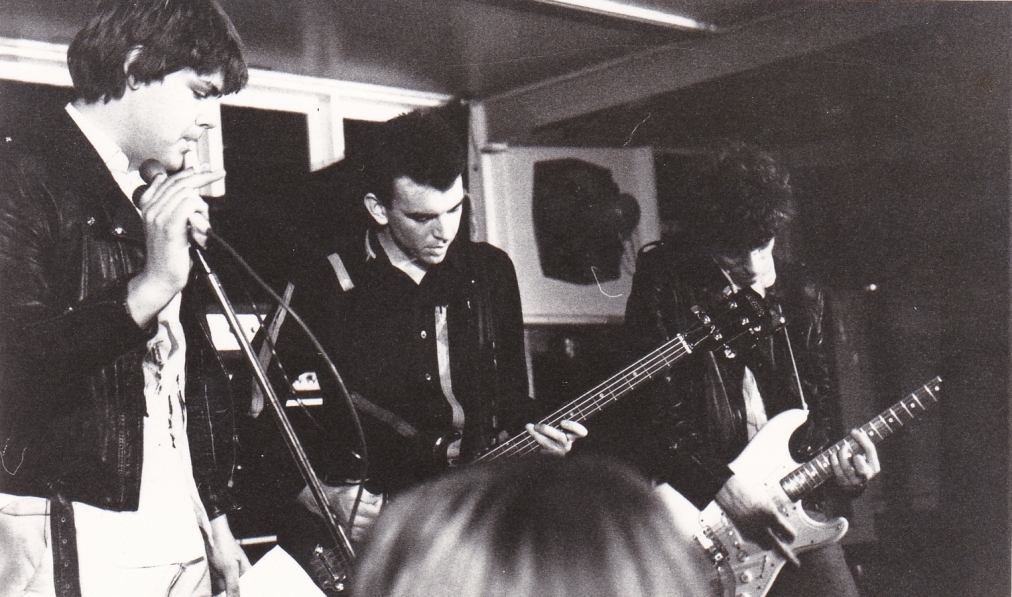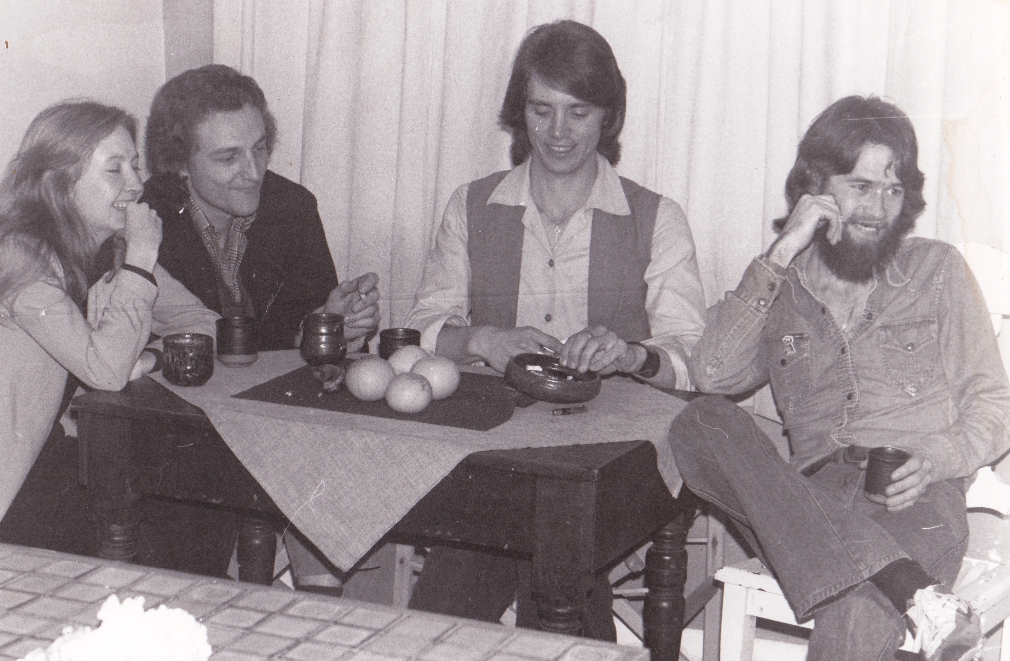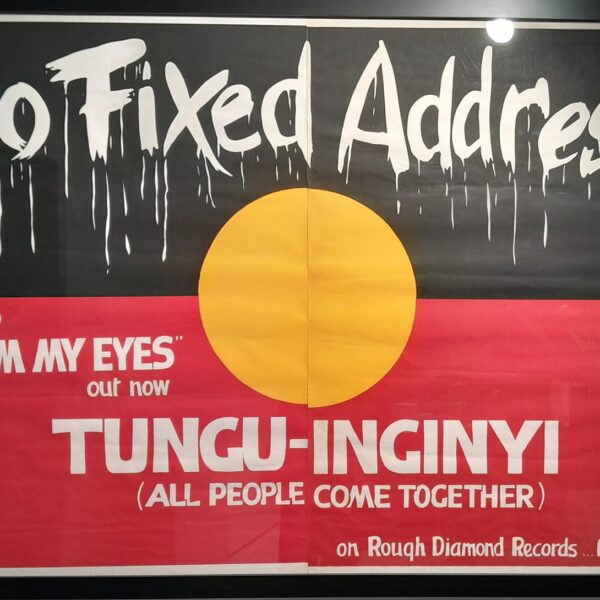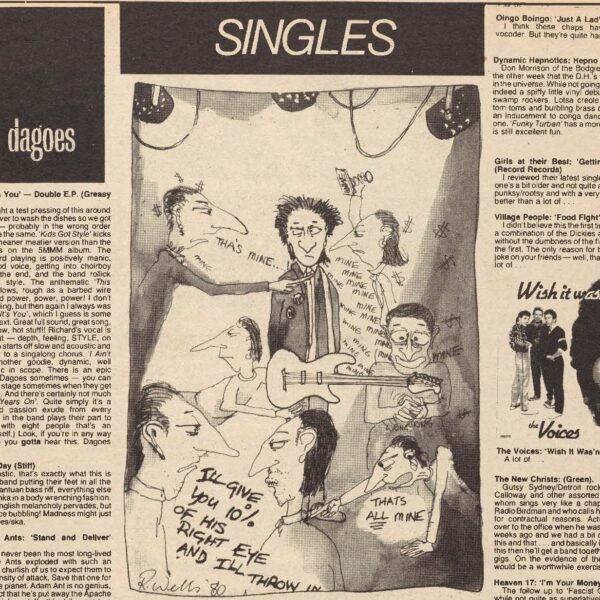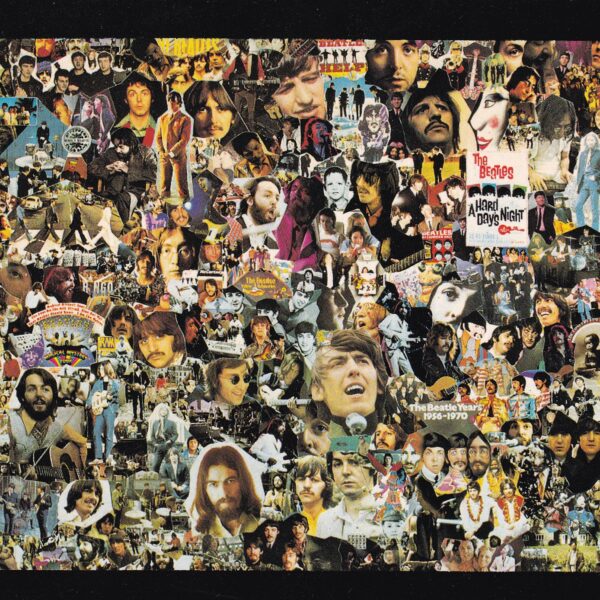As the 1970s wound to a close, the local music scene in Adelaide was struggling, although there were some new shoots starting to appear.
It seemed everyone involved was either trying to get out, or just killing time, waiting for something GREAT to happen. And it did. The advent of the Progressive Music Broadcasting Associations’s community radio station 5MMM-FM in 1980 gave Adelaide music an absolute turbo-charge and helped to create, for a brief, wonderful period, the most exciting local scene in the country. Before all of that however, this was my take on the venues, the media, the bands and the music, published in the August 1979 issue of Roadrunner.
* * *
Adelaide has a long and honourable tradition in the field of rock and roll. The number of musicians and other people involved in the music business who have emerged from the Athens of the South over the past 15 years is vast and way out of proportion to the city’s size.
Let’s take a quick historical roll call. The Twilights, the Masters Apprentices, the Vibrants. Zoot and Fraternity all went on to national fame and fortune from Adelaide. And of today’s bands, the Angels, Cold Chisel, Stars, the Aliens and until their unfortunate breakup last month, Young Modern can claim Adelaide as their springboard. Yet despite this proven abundance of talent, the Adelaide music scene is so unstructured and disorganised that most local bands, even the popular ones, have to struggle to make ends meet. When an Adelaide band has reached the stage when it feels confident enough to go east, nine times out of ten it will go with no intention of ever coming back, except as a headline act.
The main problem with the city, as I see it, is the two definite tiers to live music (three if you count overseas acts). There is the once lucrative, but now not so lucrative, interstate band circuit (basically the Arkaba and John Pike’s Northern Promotions circuit) and the small inner city hotel venues (the Tivoli, the Marryatville, the Richmond, the Centralia, the Cremorne and others) that subsist mainly on local bands. There is virtually no traffic from the lower tier to the upper, and these days the only interstate band you are likely to see in the ‘lower’ tier is one who is prepared to come to town purely for the exposure. There is no medium range, either for local bands or interstate acts.
The difference between these two tiers has been accentuated by the current economic climate. Fewer people can afford to pay to go out to see a band these austere days. Couple that with Adelaide’s reputation for having the most critical music audience in the country and what have you got? A slump, that’s what. People are not going to go out to see a band unless they know they are going to have a guaranteed good time and/or are going to get in for next to nothing.
The second approach is already being attempted at the Marryatville, Adelaide’s longest running rock pub, Brian Thomas, who runs the room at the hotel, has adopted the policy of putting on a couple of local bands on Friday and Saturday nights without charging admission. And it’s working. People are going to the Marryatville, the bands are getting union rates, paid out of the increased bar takings and at the end of the night everyone is happy.
The first approach, of ensuring that everyone has a good time, is a little harder to guarantee. The Arkaba’s policy of bringing in the top Premier Artists and Nucleus bands from Melbourne every week is not paying the dividends it used to, if attendances are any yardstick. With an admission price of up to $6 and drinks and travelling expenses on top of that, one would be lucky to spend less than $15 for an evening’s entertainment at the Arkaba. There are not that many rock’n’roll fans who can afford that if they also want to see the latest hot local band and maybe a concert from an overseas act in the same week. Obviously the door price charged has a direct connection with the fee that the headline act is asking (a fee that is going up all the time due to the increasing cost of keeping a band on the road). But if neither party is getting what they want out of the present arrangement (i.e. money for the promoter and audiences for the band) then both parties need to look at the existing situation and see how it can be improved.
What is the answer? Well, one person who can claim to have the experience and the overview necessary to come up with the solution to Adelaide’s current predicament is Ray ‘Lone Star’ Dyett. A little background information is probably in order here. After a history of playing in Adelaide bands (1962-72) and then managing local bands (1975-76), Ray Dyett started the Lone Star Rock and Roll circuit in the winter of 1976. Building from his first venue, the Marryatville Hotel, by mid-1977 Ray was also putting on shows at the Tivoli, the Highway Inn, the St. Leonards Hotel and the Largs Pier Hotel. More than any other person he was responsible for the 1977-78 pub rock boom in Adelaide. The Lone Star circuit was operating from Tuesday through to Sunday with top interstate bands, the not-so-top interstate bands and local acts. However constantly increasing band fees, coupled with declining attendances (the audience, having been fed a diet —whoops—of the top rock available in the country, wasn’t going to accept what they considered a drop in quality) eventually forced Ray to abandon his independent stance and accept a position as room manager at the Marryatville. From there he opened Sweethearts at the Hotel Finsbury, a venue that closed after only three weeks due to the dampening effect of large numbers of police on the hotel management. He is now putting on a series of Lone Star super-sessions at the Woodville Town Hall, the first of which featured the Angels and was a raging success.
‘Cut the supply of interstate bands. The supply is vastly exceeding the demand and even the big acts are not pulling enough people to cover expenses.’ — Ray Dyett.
I asked Ray what he felt the solution to Adelaide’s current rock scene decline was: ‘Cut the supply of interstate bands. The supply is vastly exceeding the demand and even the big acts are not pulling enough people to cover expenses. If there were only two interstate acts playing in town each month and during the in-between weeks the venues were putting on local bands with a small admission price or no cover charge at all, and paying the band out of the bar takings, then they’d get a lot more people going out because it wouldn’t cost them the earth. But the only way this situation, that Nirvana if you like, is going to occur is if all the promoters get together and then present a plan to the hotel managers. There are too many egos in this town, however, for that to ever happen.’ I would hope for the sake of the Adelaide music scene that Dyett is wrong, for the city really does need some kind of co-operative spirit if it is to extricate itself from the present predicament.
If Dyett’s plan appears too idealistic to some people, there is a working model—the city of Perth. Because of its geographical isolation, Perth only receives visits from interstate bands about every two months. It also misses out on a lot of the overseas touring acts. This means that the local scene there is extremely healthy and bands can make a living out of what they do. Dave Warner is perhaps the most well-known W.A. export, but Perth bands, the Manikins, the Scientists and the Dugites have all released their own independently produced singles this year and the Dugites and the Manikins have just commenced their first national tour.
If Adelaide could achieve by design what Perth has by geographical accident then the undoubted depth of talent that the city has to offer would have a much simpler task. One of the reasons put forward for the grand tradition of nationally successful Adelaide bands is that to actually get to the stage where they can look at moving interstate, a band has to have the commitment and faith in itself to overcome the large and. numerous hurdles that exist in Adelaide.
Mal Eastick of Stars, the ex-Adelaide country rock combo that has just released its second album on Mushroom, reckons that Adelaide is the best place in the country to get a band together: ‘The only thing that Adelaide doesn’t teach you as a band is how to present a rock’n’roll show. Part of the reason for that is that once you’ve been playing in a band here for a while you start to recognise more and more faces in the crowd and that can have the effect of inhibiting your “performing aspect”.’
‘Adelaide is the best place in the country to get a band together’ — Mal Eastick, Stars
Furthermore, when ex-Adelaide bands develop the performance necessary to make an impression on Eastern audiences they are often criticised when they come back for that very change. There is still an attitude held by a sizeable number of Adelaide musicians that any element of self-promotion and business dealing on the part of a band is hype and therefore dirty.
A consequence of this attitude is that the Adelaide mass media (the dailies, the commercial radio stations and the television stations) are unaware of what is going on in the local musical underground, Of course, it should be added that the mass media is not really taking time out to discover what is going on around it, but if more bands did a bit of self-promotion then mass media would at least have an idea of what was happening.
The two bands currently playing that seem to have the best chance of escaping Adelaide’s vicious circle are Terminal Twist and Lemmy Caution. The two bands came first and second respectively in the recent 5MMM-FM Rock Off, an event that set out to showcase the musical talent that Adelaide has to offer. That the event was a success is beyond doubt. Fifteen hundred people turned up to Flinders University to watch the finalists go through their paces and the event achieved good publicity for the station and the bands. The two industry gentlemen brought over from Melbourne, Michael Gudinski and Mike Rudd, went away impressed and overall the event made a profit (which was shared out among the eight participating bands).
‘There’s no one to learn from in Adelaide. Even if I wasn’t in a band I’d still move to Sydney. Adelaide is culturally dead.’ — Chris Coleman, Terminal Twist
The first prize in the event, a week’s work in Melbourne through Premier Artists and a week in Sydney courtesy of Nucleus, was an unexpected bonus for Terminal Twist, who had already decided to leave Adelaide for the greener pastures of Sydney. After winning the prize they are now guaranteed some initial work in the country’s two major population centres. But Terminal Twist are not happy to just wait for success to come to them and it is this attribute that really sets them apart from most of the other bands in Adelaide. They have arranged, off their own backs, gigs in Mt Gambier on their way to Melbourne and a weekend in Canberra en route from Melbourne to Sydney. They would also like to do a North Coast and Queensland tour as soon as possible after finishing their work in Sydney. The success of their self-financed E.P. can be attributed to a large degree, musical considerations aside, to the long hours they put into promoting and publicising it. The E.P. actually made the 5KA charts but due to the atmosphere of musical conservatism gripping Adelaide commercial radio at present failed to make the playlist, and dropped out.
Why are you moving to Sydney? I asked the band. ‘It’s bigger, it’s more central and we will be able to get more work,’ stated keyboard player Malcolm McCallum flatly. ‘It’s also a stylistic thing,’ chipped in guitarist Chris Coleman. ‘There’s no one to learn from in Adelaide. Even if I wasn’t in a band I’d still move to Sydney. Adelaide is culturally dead.’
‘If you ever want to make a living out of being a musician you have to go to Sydney or Melbourne,’ said Malcolm. ‘There are an awful lot of hobby musicians in Adelaide. It’s real easy to hold down a job and play in a band. There’s very little professionalism—bands don’t practise, they don’t have managers, in fact people think that it’s weird if you do have a manager. Promoters think you are presumptuous if they have to deal with someone outside the band members. Then bands don’t really take enough time to get a good stage sound when they do get a gig. A lot of people thought we were crazy when we started putting mikes on the drums. “You don’t do that for Adelaide,” they’d say. But we were looking ahead to the time when we would have to do that.’
Do you think that there is any way the present situation can be improved? ‘No, given the present lack of co-ordination I think it’s completely inevitable.’
Terminal Twist exude an air of quiet confidence. They don’t believe they are going to set Sydney on fire as soon as they get there, but they believe in themselves as a band and feel they have something to offer musically. ‘I reckon we’ll have to spend all the money we make in the first six months in Sydney on improving our stage equipment and publicising ourselves,’ says Malcolm. ‘We’re definitely taking a long-term view.’
It’s interesting that the band poised to take over Terminal Twist’s mantle as ‘the band most likely to’—Lemmy Caution—also take a long-term view. Perhaps it’s due to the fact that they are all fairly experienced musicians. Peter Horsam played with the legendary blues outfit Smokestack Lightning; Linz Norris and Ric Grudzinskas come from Townsville’s Pensioners (who also provided Terminal Twist’s bass player Jeff Urquhart); George Sutanovic has an illustrious history with Adelaide bands and Lizzy Hogan was an acoustic folk singer before the band came into being.
The present line-up has only been together since March and according to Ric, ‘Things are happening as fast as we could hope for.’ The Lemmys immediate aim is to build up a solid following around Adelaide before taking the inevitable plunge interstate. ‘We would want a reasonable recording offer before we would consider moving out of Adelaide,’ said Peter Horsam. ‘Then when we do go, hopefully we would have a recording out that we could promote.’
It was Lemmy Caution’s original songs that particularly impressed Mike Rudd and Michael Gudinski at the Rock Off and cassettes of the three tracks they recorded at Adelaide’s Slater Sound Studio (their prize from the Rock Off) are currently with the two gentlemen. Mike Rudd is interested in producing the band and Gudinski stated, as he announced the results, that he is interested in signing the band to a Mushroom publishing contract.
For those who have seen or heard a Lemmys’ performance this interest may seem a little over-enthusiastic as their live sound has never quite done justice to their excellent music and lyrics. But with the acquisition of Tony de Jaeger of Noumenon Studios as sound mixer this problem will hopefully be solved.
If I had to put a label on Lemmy Caution’s sound, and I’ve got nothing against labels as long as they are used thoughtfully, then I guess I would call it ‘Britpop’. They play SONGS, well structured and arranged three-minute gems, with witty lyrics and catchy melodies and choruses. If the quality of the songs recorded at Slater’s (Art School, Plastic and Dole) is any indication of the band’s potential then it shouldn’t be too long before the Lemmys follow the well-trodden path from Adelaide cult band to national success.
There is in fact a healthy amount of independent recording going on in the city, a fact that is undoubtedly helping bands refine their musical ideas and increase their confidence. Recordings, be they tapes or records, also enable local acts to get their music across to a wider audience than the one that goes out to the pubs. If these local recordings were getting more airplay on the commercial stations to complement the excellent coverage 5UV gives with its limited musical airtime, then that exposure would obviously be much greater. As it is, the commercial stations are content to force-feed the public the commercial disco/ballad rubbish that they consider to be the popular taste. Don’t let anyone tell you that Adelaide radio is ‘progressive’.
‘The combinations may change but the music keeps coming.’ —Tony de Jaeger, Noumenon Studios
Some of the local releases that have failed to catch the ear of the city’s music programmers include: Young Modern’s She’s Got The Money; the U-Bombs’ Give Me A Medal; Systems Go’s No More Christmas, Carol, the aforementioned Terminal Twist EP, plus the live cassette Live at the Marryatville featuring the Accountants, the U-Bombs and the Dagoes (which was on 5KA’s Alternative Chart for over three months without achieving anything but limited Sunday night Album Show airplay); A Night With The Dagoes; the Bank of France 13 song studio cassette and the latest, a compilation studio cassette from Tony de Jaeger’s Noumenon Studio, Coop, which includes at least two certified classics, The Pensioners’ No Dough In Adelaide and the Innocents’ Let’s Get Pissed as well as worthwhile stuff from Soka (white reggae), Fly By Night (jazzy), the Dagoes (punkoid), the Treacherous Sea Lions (salty) and others. Coop is an interesting document. It was recorded over the last six months and such is the turnover of musicians and bands in Adelaide only one of the bands that grace the tape (The Innocents) is still functioning. ‘The combinations may change but the music keeps coming,’ says Tony de Jaeger, philosophically. And he’s right, you know. There are a lot of bands that would flourish if the desert of the Adelaide music scene could be irrigated with some commitment and co-operation.
The Accountants, who have just returned from Melbourne, where they supported the Boys Next Door at the Crystal Ballroom, are one band who would certainly have benefitted from a more open-minded musical climate. Their hard, fast music and direct lyrics can create the same excitement and involvement that the best of early English punk did. But they find it hard to get gigs because of the stigma that ‘punk’ still holds for most promoters. Thus they don’t make much money and after nearly eighteen months they still don’t own their equipment (first base for any aspiring combo). Still they are nothing if not keen, so don’t expect them to just fade away.
The U-Bombs, who did everything right, recorded their own record, went on an Eastern states shoestring tour and got crowds when they played, are still struggling along, although with the addition of Mark Cornwall on bass and Paul Tuxworth chucking in a bit of keyboards their sound is a lot more fleshy than when they were THE high-speed-car-chase band in town.
Street Corner Jack, the band that took out third prize in the 5MMM Rock Off with their powerfully funky performance are taking time out to reassess their repertoire (i.e. throw out a lot of their cover versions) and write some more original material. A timely move methinks, as Adelaide cover bands have a tendency to become very popular and often find it very difficult to incorporate original material into their performance. This leads to frustration and the eventual disbanding of the group (as happened with Soka). The more original sounding Jacks will be coming on strong in about a month’s time.
(The U-Bombs’) … sound is a lot more fleshy than when they were THE high-speed-car-chase band in town.
The Immigrants, relative newcomers on the scene, and hampered by illness in the band, have not really gotten into full stride yet, but from their couple of appearances they will be well worth keeping an eye on in the coming months.
With the break-up of Soka—Adelaide’s most successful band of the last three months (they pulled 700 people to their farewell performance)—a new band comprising Wilson Main, Geoff Gifford of Soka and Arnold Strahls, late of Systems Go, will be appearing quite soon, while Hot Chicken have added Soka guitarist Bruno Lucia and will be moving away from the strictly blues flavour of the present line-up to a more R&B sound.
The Dagoes refused to die and have returned as the Tony Rome Band.
Redeye, who had a moderate chart hit with their single Main Street, are still pulling in the punters at the Eureka Bar, Trades Hall and the Seacliff with their country-flavoured rock and may be recording an album. They are playing Sydney in September. The Stunts, a hard rocking outfit in the Cold Chisel mould are about to plaster themselves all over the nation’s psyche courtesy of Countdown. Mickey Finn, the REAL pensioners of the Adelaide scene, still manage to crank out their blues/boogie with an enthusiasm that would shame musicians half their age. The Dagoes refused to die and have returned as the Tony Rome Band. They’ll have a three track record out sometime this month and it’s bound to sell, cos’ two of ’em work in record shops!
Then there is Foreign Body, all female and feminist, who have a strong following amongst their peers; The Innocents, who if Let’s Get Pissed is typical of their work should be great live (I haven’t seen them yet); the Hounds, a driving rock band who suffer a little from lack of presentation but who certainly cut it in the musicianship stakes; the jazz fusion school (Off The Cuff); the zany and seemingly indestructible Soapbox Orchestra; and many more.
But the most successful band in Adelaide at the present moment is surprisingly (or maybe not so surprisingly) one that plays very few gigs, doesn’t play electric instruments and whose members all have full-time day jobs. Yes, I’m talking about Redgum. A politico-folk band, whose album, If You Don’t Fight You Lose has now sold more than seven thousand copies nationally and could end up achieving gold record status if it maintains its present rate. The album, a pertinent but undidactic examination of present day Australian culture/politics/society, is considered too ‘hot’ for commercial airplay, but it’s receiving generous airplay on Australia’s unofficial network of fringe radio stations (2JJ, 3CR, 3RRR, 4ZZZ and 5UV). Every time the band plays in Melbourne they are given a hero’s welcome by their legion of fans there (a recent Collingwood Town Hall Concert which also featured the Bushwackers and Jeannie Lewis drew a crowd of 3000) and they have been booked for a headline tour of Sydney (Lifesaver, Stagedoor etc.) later this year, Redgum have steered well clear of the fragmented Adelaide scene and, if you think about it, it hasn’t done them any harm at all.
Hmm, think about it.


